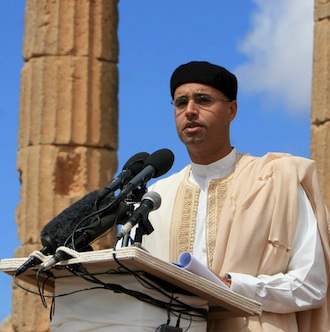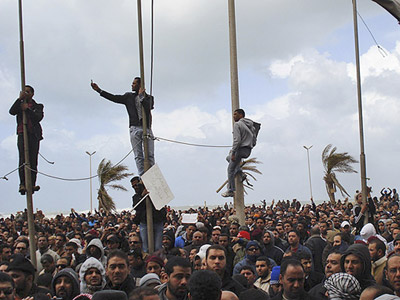Rabat / Tripoli / Cairo. Ato .- The United Nations High Commissioner for Refugees (UNHCR) today amounted to 100,000 people the number of migrant workers in Libya who have fled in recent days of repression exerted by the Gaddafi regime against popular rebellion. UNHCR has set up emergency teams in the Tunisian and Egyptian borders to help local authorities and NGOs present in the field to address the humanitarian catastrophe.
The Tunisian government informed UNHCR that since February 20 40,000 people crossed the border from Libya, and was expected to flow another 10,000 during the weekend. Of these, 18,000 were Tunisians, 15,000 Egyptians, 2,500 Chinese and 2,000 Libyans. For his part, Egyptian authorities said that UNHCR about 55,000 people had crossed the border since 19 February.
Of these, 46,000 were Egyptians, 2,100 Libyans, and about 6,900 of various nationalities, especially Asians. "We are committed to assisting any person escaping from Libya. We call upon the international community to respond quickly and generously to help these governments cope with the humanitarian emergency," said High Commissioner Antonio Guterres, said in a statement.
UNHCR is also having to attend to people who are in "no man's land" between Libya and Egypt, not having valid passports. UNHCR teams were able to enter Libyan territory yesterday, where they met with police and disaffected military regime and tribal leaders who warned of the lack of food and medicine in the eastern country.
In turn, the UN agency warned tribal elders risk of threats against African immigrants, since the population can be confused with the mercenaries hired by the regime to carry out repression. Meanwhile, troops loyal to the Libyan leader, Muammar Gaddafi, has launched a scathing attack against the rebel forces during the night on Saturday in the town of Zawiyah, 50 kilometers from the capital, killing at least 50 civilians and leaving several injured , as reported by a resident British news agency Reuters.
These data could not be confirmed on the ground, so that lack independent verification thereof. The source informant, who was identified only as Ibrahim, said that a "mercenary force" has used heavy artillery to make a raid on Martyrs' Square and has been at least 30 civilians missing. "Heavy artillery was mounted on wheeled vehicles and has fired indiscriminately at people who were in the square.
Young children and elderly have died. I counted the dead," said the agency through a phone call from Zawiyah. "Some have buried their relatives in the square, while others were buried in the cemetery of the city. About 50 others seriously injured, many of them may not survive," he noted.
Eyewitnesses indicated that Zawiyah is under opposition control, but around the area still occupied by pro-government soldiers. On the other hand, opposition to Gaddafi managed to become the third largest city, Misurata, and government troops and militias have dropped out, said a resident in a conversation with Arab broadcaster Al Jazeera.
On the outskirts of the city still isolated battles, he said. Misurata is located about 200 kilometers east of the capital, Tripoli, and Libya's economic center. The opposition claims that the whole east of country is "liberated." Meanwhile, Gaddafi in Tripoli remains entrenched in defiance of sanctions which had just imposed by the Security Council of the UN.
The leader is in the area of Bab al Asisiya, which is surrounded by impressive security measures, according to the newspaper "Asharq Al Awsat." Militias loyal to the government control access to the neighborhood. The former Libyan Justice Minister Mustafa Abdul Jalil has announced that it will be at the port of Benghazi a transitional government.
According to preliminary estimates, 750 people died in Benghazi. The death toll across Libya is well over a thousand, according to Libya's UN ambassador Ibrahim Dabbashi. On Saturday, the Security Council adopted a series of UN sanctions on Qaddafi and his top aides and instructed the International Criminal Tribunal in The Hague to investigate crimes and violations of human rights committed by the regime.
Resolution 1970 asks the court to investigate the brutal suppression of protests, imposing a total arms embargo, travel ban and freeze overseas assets of Gaddafi and 21 people around, including several relatives. 


The Tunisian government informed UNHCR that since February 20 40,000 people crossed the border from Libya, and was expected to flow another 10,000 during the weekend. Of these, 18,000 were Tunisians, 15,000 Egyptians, 2,500 Chinese and 2,000 Libyans. For his part, Egyptian authorities said that UNHCR about 55,000 people had crossed the border since 19 February.
Of these, 46,000 were Egyptians, 2,100 Libyans, and about 6,900 of various nationalities, especially Asians. "We are committed to assisting any person escaping from Libya. We call upon the international community to respond quickly and generously to help these governments cope with the humanitarian emergency," said High Commissioner Antonio Guterres, said in a statement.
UNHCR is also having to attend to people who are in "no man's land" between Libya and Egypt, not having valid passports. UNHCR teams were able to enter Libyan territory yesterday, where they met with police and disaffected military regime and tribal leaders who warned of the lack of food and medicine in the eastern country.
In turn, the UN agency warned tribal elders risk of threats against African immigrants, since the population can be confused with the mercenaries hired by the regime to carry out repression. Meanwhile, troops loyal to the Libyan leader, Muammar Gaddafi, has launched a scathing attack against the rebel forces during the night on Saturday in the town of Zawiyah, 50 kilometers from the capital, killing at least 50 civilians and leaving several injured , as reported by a resident British news agency Reuters.
These data could not be confirmed on the ground, so that lack independent verification thereof. The source informant, who was identified only as Ibrahim, said that a "mercenary force" has used heavy artillery to make a raid on Martyrs' Square and has been at least 30 civilians missing. "Heavy artillery was mounted on wheeled vehicles and has fired indiscriminately at people who were in the square.
Young children and elderly have died. I counted the dead," said the agency through a phone call from Zawiyah. "Some have buried their relatives in the square, while others were buried in the cemetery of the city. About 50 others seriously injured, many of them may not survive," he noted.
Eyewitnesses indicated that Zawiyah is under opposition control, but around the area still occupied by pro-government soldiers. On the other hand, opposition to Gaddafi managed to become the third largest city, Misurata, and government troops and militias have dropped out, said a resident in a conversation with Arab broadcaster Al Jazeera.
On the outskirts of the city still isolated battles, he said. Misurata is located about 200 kilometers east of the capital, Tripoli, and Libya's economic center. The opposition claims that the whole east of country is "liberated." Meanwhile, Gaddafi in Tripoli remains entrenched in defiance of sanctions which had just imposed by the Security Council of the UN.
The leader is in the area of Bab al Asisiya, which is surrounded by impressive security measures, according to the newspaper "Asharq Al Awsat." Militias loyal to the government control access to the neighborhood. The former Libyan Justice Minister Mustafa Abdul Jalil has announced that it will be at the port of Benghazi a transitional government.
According to preliminary estimates, 750 people died in Benghazi. The death toll across Libya is well over a thousand, according to Libya's UN ambassador Ibrahim Dabbashi. On Saturday, the Security Council adopted a series of UN sanctions on Qaddafi and his top aides and instructed the International Criminal Tribunal in The Hague to investigate crimes and violations of human rights committed by the regime.
Resolution 1970 asks the court to investigate the brutal suppression of protests, imposing a total arms embargo, travel ban and freeze overseas assets of Gaddafi and 21 people around, including several relatives.



No comments:
Post a Comment